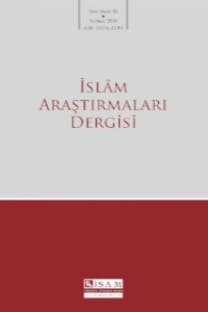İlâhî Fiillerin Nedenliliği Sorunu: Gazzâlî’nin Meseleye Yaklaşımı ve Katkısı
Bu makalede Tanrı’nın fiillerini iradî olarak mı, yoksa zorunlu olarak mı yaptığı sorununun hangi saiklerle ve nasıl ortaya çıktığı tespit edilecek, temel yaklaşımların neler olduğu ve bu yaklaşımların eleştiriye açık yönleri üzerinde durulacak, ardından da Gazzâlî’nin (ö. 505/1111) yaklaşımının kelâmî açı- dan en tutarlı çözüm olduğu iddiası ispatlanacaktır. Kanaatimce kelâmdaki çözümler içinde en tutarlı olanı, Eş‘arî’nin düşüncesini ilâhî ilimle ilişkilendirerek yeniden yorumlayan Gazzâlî’nin yaklaşımıdır. Bu nedenle ilerleyen sayfalarda önce Eş‘arî, Mâtürîdî ve Kadî Abdülcebbâr’ın görüşlerini özetleyerek bunların açmazlarına işaret edeceğim, sonra da Gazzâlî’nin çözümünü ve bu çözümün niçin daha tutarlı olduğunu anlatacağım. Kelâm tarihinde yoğun tartışmalara konu olan bu sorun hakkında kitap ve makale seviyesinde çeşitli çalışmalar yapılmıştır. Fakat bu çalışmalar, sorunun hangi saiklerle ve nasıl ortaya çıktığını, tartışmaya katılan düşünürlerin görüşlerinin sistematik bir tenkidini ve sorunun çözümündeki aşamaları tespitte başarılı değildir.
Anahtar Kelimeler:
ilahi fiiller, nedensellik, akıl, yaratma, adalet
The Problem of the Cause of Divine Actions: Can Allah’s Wisdom be Questioned?
The principle of “Allah possesses absolute power”, which is commonly accepted by all theologians, generally becomes problematical when we examine the reasons why something was created or according to what a certain thing was created or why it was preferred. In addition, when we look at the moral outcome of the idea of absolute power we are confronted by an “unquestionable” God. In other words, if there is a lack of compulsion from the aspect of existence then there is a lack of compulsion from the moral aspect. But believers must have a metaphysical support that ensures reliance on Allah. In this situation, the concept of an unquestionable God, from the first glance, becomes unacceptable, or at least problematical. From the moral aspect, the upsetting of this unquestionability brings into doubt not just the results of the consequences of an absolute power, but also the metaphysical consequences. The common denominator that theologians have brought to the solution of this problem is to protect the idea of absolute power in principle. For this reason the solutions that are listed under the principle of absolute power, like all the results of absolute power, can be observed to be naturally limited by an understanding and acceptance of God’s will. The most powerful solution offered to this problem in the theological tradition is that of Gazzali.
Keywords:
Divine actions God's attributes, Causality, Wisdom, Creation, Justice,
___
- Seyyid Şerîf el-Cürcânî, Şerhu’l-Mevâkıf fî ilm’i-l-kelâm, Bulak: Matbaatü’s-saâde, 1907.
- ISSN: 1301-3289
- Yayın Aralığı: Yılda 2 Sayı
- Başlangıç: 1997
- Yayıncı: TDV İslâm Araştırmaları Merkezi
Sayıdaki Diğer Makaleler
Doğu-Batı Felsefi Etkileşiminde İbn Rüşd ve St. Thomas Aquinas Felsefelerinin Karşılaştırılması
An Ottoman Mentality - The World of Evliya Çelebi
Osmanlıdan Günümüze Türk Toplum Yapısı
Akıl ve İnanç: Din Felsefesine Giriş
İlâhî Fiillerin Nedenliliği Sorunu: Gazzâlî’nin Meseleye Yaklaşımı ve Katkısı
Tanrı’nın Varlığına Dair Argümanlar: Ateist Din Felsefesi Eleştirisi
